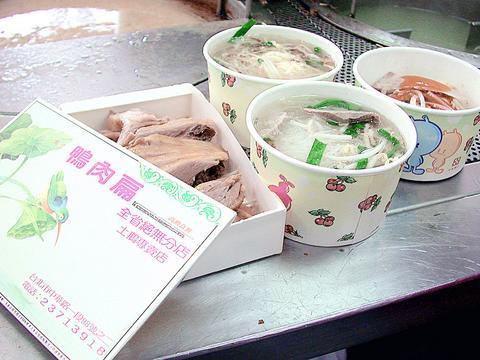Few restaurants in Taipei last much longer than six months, it seems, so a simple diner that has been in business for 53 years is worth taking a look at.
The Duck and Traditional Goose Restaurant in Hsimenting is as unpretentious as its name and delivers a standard meal with the minimum of fuss to a consistently good level, cheaply. And, if this is the secret of its success, the recipe may be found elsewhere, because the food is nothing special.

PHOTO: JULES QUARTLY, TAIPEI TIMES
The noodle soup (NT$40) is simple: Spring onions, bean sprouts -- and a sprinkling of fried-and-dried onion flakes to give a touch of sweetness -- are submerged in a clear broth with a thin veneer of essential fats and oils. Earthenware bowls have given way to plastic facsimiles which can be quickly cleaned and sent out again. The sliced goose meat (NT$60 for a small plate) is always fresh -- since it doesn't hang around -- and arrives with a garnish of ginger and dollops of red and dark brown sauce. Chopped intestines (
Other goose-and-soup joints' food may be more flavorsome but they vary, often from day to day. The Duck and Traditional Goose Restaurant remains the same. "One and only," is how the current second-generation owner, Chang Jen-ho (
It all began in 1950 as a street stall, run by a Taiwanese family whose business was boosted by the arrival of hungry Kuomintang soldiers. Though the family that started the business no longer runs it, the proud boast is there have been no changes -- which is believable if not entirely true.
There are two stories to the restaurant and the ground floor is what might grandly be termed "open plan," with mainly stainless steel fittings and around 16 formica-topped tables surrounded by those small stools that allow six or more people to share a table.
There are 20 plus tables upstairs and the calculation of 200 people at a sitting, NT$100 per head, 30 minutes turnaround, up to NT$40,000 an hour, 11 hours a day, seven days a week, adds up to serious money at the end of a good year.
So, no wonder that the service doesn't need to come with a smile and publicity, while not turned down, is not invited either. This is a seriously successful diner that is still packing them in after 50 years.
The boss may not be much of a talker, but he is always there watching the sidewalk for signs of business, keeping an eye on the cooks huddled over their vats of soup and chopping up hundreds of thousands of birds.
He is the captain of his ship and The Duck and Traditional Goose Restaurant can be depended on for good value -- sit down or take away -- while he's on board.

US President Donald Trump may have hoped for an impromptu talk with his old friend Kim Jong-un during a recent trip to Asia, but analysts say the increasingly emboldened North Korean despot had few good reasons to join the photo-op. Trump sent repeated overtures to Kim during his barnstorming tour of Asia, saying he was “100 percent” open to a meeting and even bucking decades of US policy by conceding that North Korea was “sort of a nuclear power.” But Pyongyang kept mum on the invitation, instead firing off missiles and sending its foreign minister to Russia and Belarus, with whom it

When Taiwan was battered by storms this summer, the only crumb of comfort I could take was knowing that some advice I’d drafted several weeks earlier had been correct. Regarding the Southern Cross-Island Highway (南橫公路), a spectacular high-elevation route connecting Taiwan’s southwest with the country’s southeast, I’d written: “The precarious existence of this road cannot be overstated; those hoping to drive or ride all the way across should have a backup plan.” As this article was going to press, the middle section of the highway, between Meishankou (梅山口) in Kaohsiung and Siangyang (向陽) in Taitung County, was still closed to outsiders

President William Lai (賴清德) has championed Taiwan as an “AI Island” — an artificial intelligence (AI) hub powering the global tech economy. But without major shifts in talent, funding and strategic direction, this vision risks becoming a static fortress: indispensable, yet immobile and vulnerable. It’s time to reframe Taiwan’s ambition. Time to move from a resource-rich AI island to an AI Armada. Why change metaphors? Because choosing the right metaphor shapes both understanding and strategy. The “AI Island” frames our national ambition as a static fortress that, while valuable, is still vulnerable and reactive. Shifting our metaphor to an “AI Armada”

The Chinese Communist Party (CCP) has a dystopian, radical and dangerous conception of itself. Few are aware of this very fundamental difference between how they view power and how the rest of the world does. Even those of us who have lived in China sometimes fall back into the trap of viewing it through the lens of the power relationships common throughout the rest of the world, instead of understanding the CCP as it conceives of itself. Broadly speaking, the concepts of the people, race, culture, civilization, nation, government and religion are separate, though often overlapping and intertwined. A government